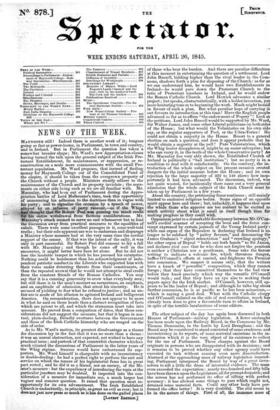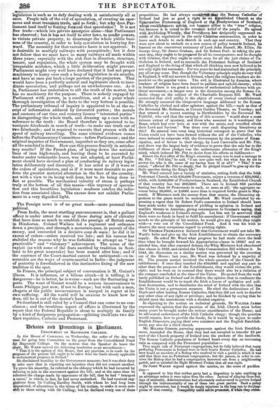The other subject of the day has again been discussed
in both Houses of Parliament—railway legislation. A fierce onslaught has been made upon the Railway Board, in the Commons by Mr. Thomas Duncombe, in the Lords by Lord Brougham : and the Board may be considered to stand convicted of some crudeness and inconsistency in its reports, of some material omissions in the in- formation which it is the very object of its existence to collect for the use of Parliament. These charges against the Board originate in persons who are disappointed with its decisions ; and it remains to be proved whether any other agency could have executed its task without causing even more dissatisfaction. Alarmed at the approaching mass of railway legislation impend- ing, Parliament interposed the Board by way of a great sieve- screen to sift a little the dross of interested evidence. The mass even exceeded the expectation : nearly two hundred and fifty bills have been thrown upon the Legislature, all for prompt despatch; and the screen has not performed its office of sifting with perfect accuracy : it has allowed some things to pass which ought not, detained some material facts. Could any other body have per- formed the office better It is very doubtful. The evil seems to lie in the nature of things. First of all, the immense mass of legislation is such as to defy dealing with it satisfactorily all at once. People talk of the evil of speculation, of creating an enor- mous and most transient trade, and so forth ; but,why does Par- liament lend itself to forcing forward that speculation ? It is not free trade—which lets private enterprise alone—that Parliamept has observed ; but it licts set itself to alter laws, to confer powers, to violate private property, to disarrange the whole Palm busi- ness of the country, in order to help speculation in hurrying for- ward. The necessity for that excessive haste is not apparent: It is desirable to multiply railways with promptitude ; but it does not follow that we must have so many railways all made -within three years especially with the risk that in direction structure, tenure, and regulation the whole system may be fraught with Irreparable miitakes, Which a little deliberation might prevent. - Parliament might very well have declared that it had not proper machinery to hurry over such a heap of legislation in six months, and have at once put back a large portion of the projectors. That ' would have been a perfectly natural and legitimate check to inor- dinate speculation, and perhaps not an unwholesome one. As it ' is, Parliament has undertaken to sift the truth of the matter, but has no machinery for the purpose. There is nobody engaged by • Parliament with powers, in a condition, and at a point where thorough investigation of the facts to the very bottom is possible. The preliminary tribunal of inquiry is appointed to be at the re- ceipt of information adduced by interested parties ; the morals and customs of our time and country license interested parties" in disregarding the whole truth, and dressing up a case with no reference-to the truth : the Board therefore is appointed to in- vestigate falsehoods in search of truth—to make one truth out of two falsehoods ; and is required to execute that process with the speed of railway travelling. The same vitiated evidence comes hetbre the Parliamentary Committees—before Parliament ; and the original inquiries of Government, imperfect as they are, come after all the mischief is done. How can this process fructify in satisfac- tory results? If the French plan, of laying down the national lines of iron high-roads, and leaving them to be executed by tender under terminable leases, was not adopted, at least Parlia- ment should have devised a plan of conducting its railway legis- lation deliberately and discreetly. It has acted as if it were at the orders of speculators, and as if it were most desirable to per- -form the greatest material alteration in the face of the country,
• not with a view to its being well done, but to its being done as fast as possible. The mechanical velocity of steam is perhaps truly at the bottom of all this mania—this urgency of specula- tion and this breathless legislation : madness catches the infec- tion from associated ideas. The excuse does not exhibit Parlia- Xaent in a very dignified light.



























